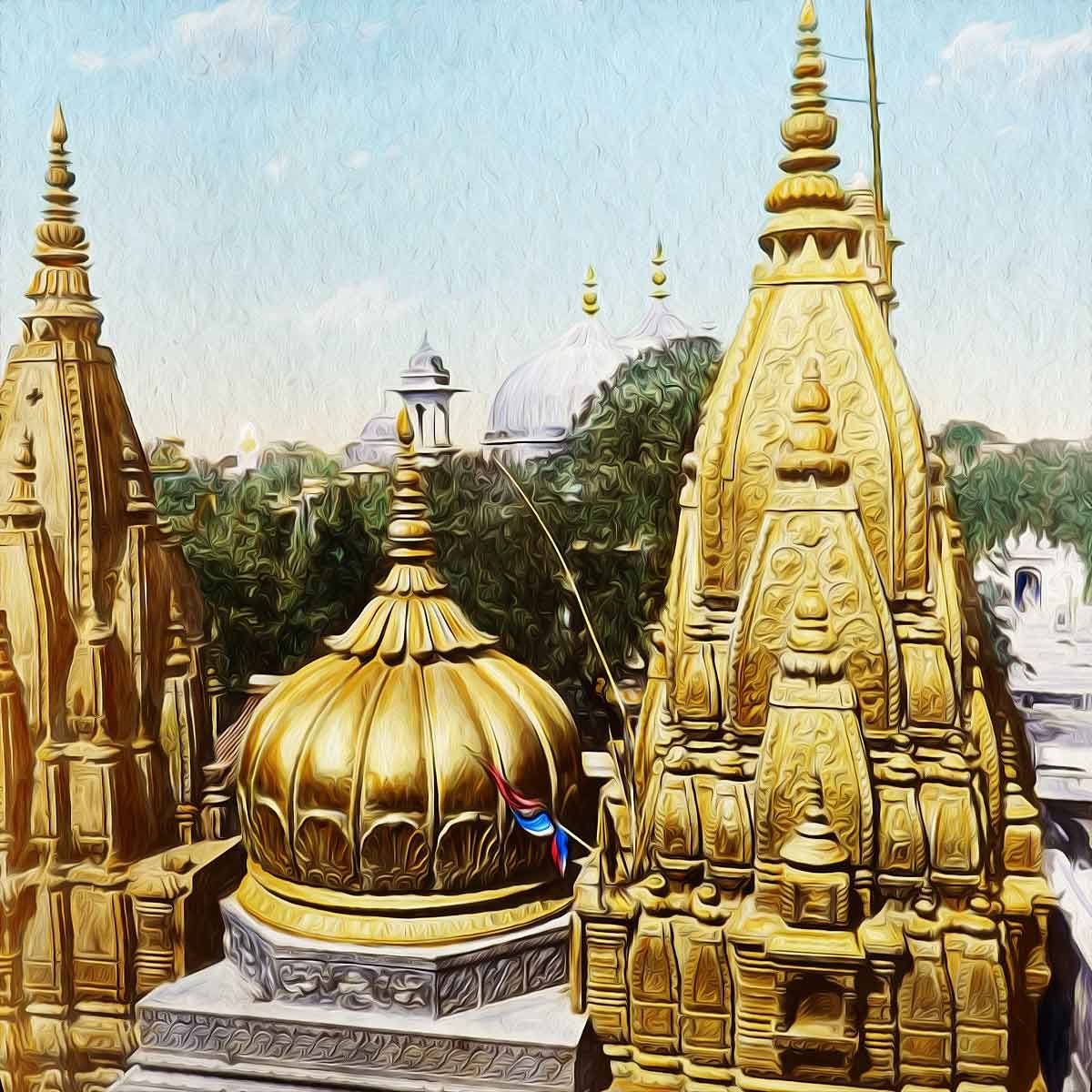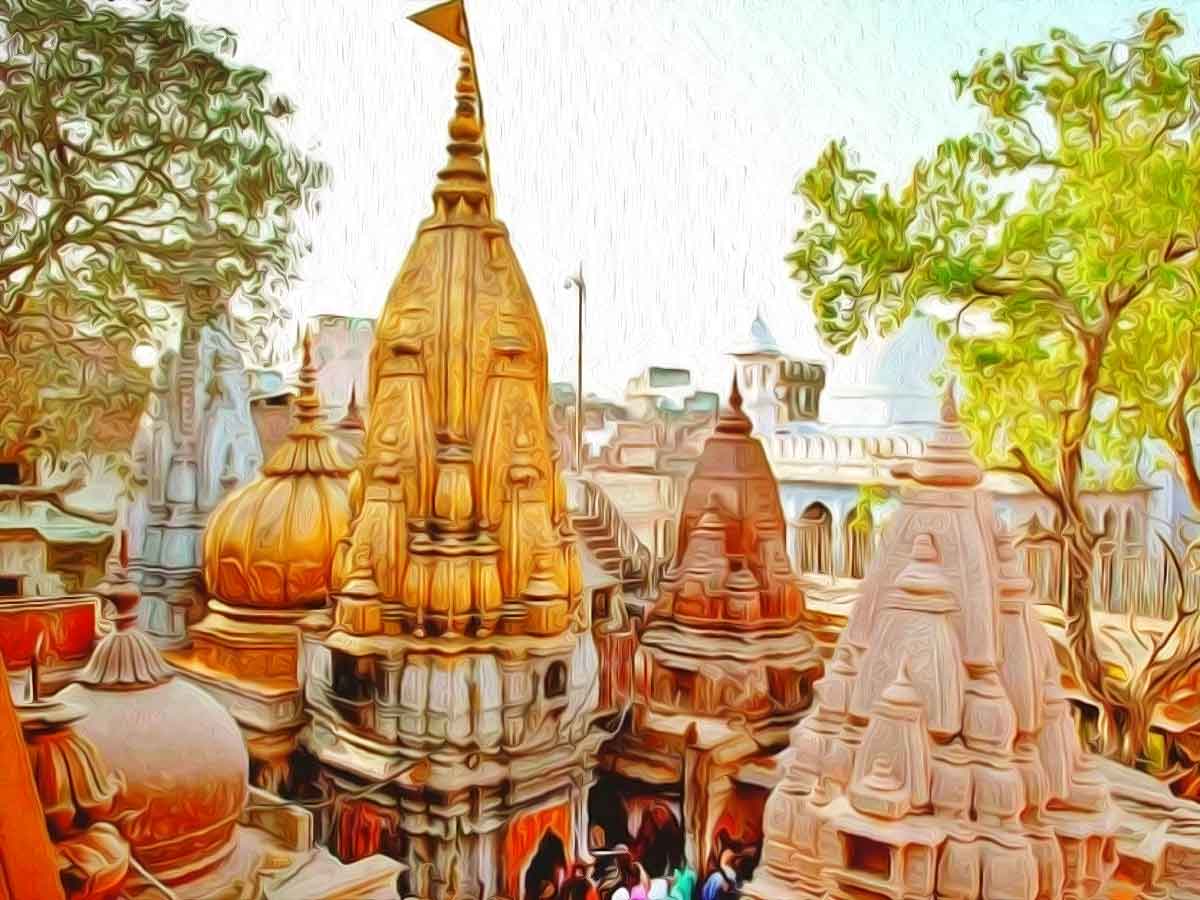Hindu side filed reply in Supreme Court: 'Gyanvapi property belonged to Lord Adi Vishweshwar since time immemorial, even before the Islamic rule in India, and hence cannot be handed to anybody'

Rakhi Singh and others, representing the Hindu side in the Gyanvapi controversy, have filed a reply in the Supreme Court outlining all of the facts justifying the temple’s existence at the Gyanvapi edifice site.
The reply was filed in response to the Masjid Committee’s special leave petition challenging the Civil Court’s orders for a survey and sealing of the mosque premises. According to the submissions, the property has belonged to Adi Vishweshwar for centuries, even before the Islamic rule in India, and hence the deity’s property cannot be handed to anybody.
In the reply submitted on behalf of the plaintiffs by Advocate Vishnu Shankar Jain, it is claimed that the property is vested in the deity Lord Adi Vishweshwar and that Gyanvapi is not a mosque since Aurangazeb did not form a Waqf by dedicating the property. According to legend, the property had belonged to Adi Vishweshwar for thousands of years and was forcibly removed by Aurangazeb.
As stated in the reply, “The property in question does not belong to any Waqf. The property had already vested in deity Adi Vishweshwar lakhs of years before the start of the British Calendar year and is continuing to be the property of the deity. No Waqf can be created on the land already vesting in a deity. In the historical books written during the Mughal regime and thereafter even Muslim historians have not claimed that Aurangzeb after demolishing the temple structure of Adi Vishweshwara had created any Waqf or thereafter any member of the Muslim community or Ruler was dedicated such property to Waqf.”
 Gyanvapi is not a mosque since Aurangazeb did not form a Waqf by dedicating the property |
“The alleged Gayanvapi Mosque is only a structure and same cannot be regarded as Mosque. Another aspect is that the disputed construction has not been erected over any Waqf property. The principle Waqf by the user cannot be applicable as the alleged Gyanvapi Mosque was constructed after demolishing a Hindu temple in 1669 at the same very place and the date of construction of the alleged Mosque is well known,” the reply further maintained.
“A Waqf can be created only on the land dedicated to Waqf by wakif who is the owner of the land. In the instant case, it is clear that from the time memorial the land and property belong to the deity and therefore there can be no Mosque there”, the reply mentions. It is asserted that a structure built on the site of a temple under the authority of any Muslim king or by any Muslim cannot be considered a mosque.
The reply asserted that in this case, “Aurangzeb did not create any Waqf and did not bequeath the property in question to the God. Therefore, the construction in question cannot be even presumed to be a mosque.” As a result, the property in question continues to be a Hindu place of worship. It is contended by the Hindu side that the religious character of the property has always been that of a Hindu temple and that it can never be interpreted as a mosque, therefore, the Places of Worship (Special Provisions) Act 1991 is not applicable because the lawsuits have no intention of changing the religious character of the place.
The response further mentions that remains of the Hindu temple may be seen on the walls of the disputed Gyanvapi structure, which stands on the site of the demolished original Kashi Vishwanath Temple. It further states that on December 30, 1810, the then-District Magistrate, Mr Watson, wrote to the President Council requesting that the Gyanvapi area be permanently given to Hindus.
The matter was heard today by the Supreme Court, which reassigned the Gyanvapi dispute case from the Varanasi civil court to the Varanasi district court. Given the intricacies of the case and the sensitive issues involved, a three-judge bench comprised of Justices DY Chandrachud, Surya Kant, and PS Narasimha stated that the matter should be handled by a senior and experienced judge.
The court went on to say that under the Places of Worship Act of 1991, there is no prohibition on determining a place’s religious character. The bench further stated that there are certain intricacies of the Act that will be considered further.
References:
opindia.com
 Support Us
Support Us
Satyagraha was born from the heart of our land, with an undying aim to unveil the true essence of Bharat. It seeks to illuminate the hidden tales of our valiant freedom fighters and the rich chronicles that haven't yet sung their complete melody in the mainstream.
While platforms like NDTV and 'The Wire' effortlessly garner funds under the banner of safeguarding democracy, we at Satyagraha walk a different path. Our strength and resonance come from you. In this journey to weave a stronger Bharat, every little contribution amplifies our voice. Let's come together, contribute as you can, and champion the true spirit of our nation.
 |  |  |
| ICICI Bank of Satyaagrah | Razorpay Bank of Satyaagrah | PayPal Bank of Satyaagrah - For International Payments |
If all above doesn't work, then try the LINK below:
Please share the article on other platforms
DISCLAIMER: The author is solely responsible for the views expressed in this article. The author carries the responsibility for citing and/or licensing of images utilized within the text. The website also frequently uses non-commercial images for representational purposes only in line with the article. We are not responsible for the authenticity of such images. If some images have a copyright issue, we request the person/entity to contact us at satyaagrahindia@gmail.com and we will take the necessary actions to resolve the issue.
Related Articles
- Does the Places of Worship Act 1991, really forbids any transformation in worship’s religious character after August 15, 1947? Gyanvapi compound may lead to its exemption if found more than 100 years old
- 'Found stone carvings of Hindu Gods-Goddesses, lotus, Seshnaag, Shrigar Gauri shrine distinctly visible, absolute remnants of ancient Hindu temple': Survey commissioner Ajay Mishra reports, Muslim side continuously uncooperative
- In a major development, Mathura court allowed a plea to remove the disputed structure of the Shahi Idgah Mosque near Krishna Janmabhoomi for hearing: suit filed in the name of "Bhagwan Sri Krishna Virajman"
- Madhya Pradesh HC accepted petition for stay on Muslims performing Namaz in the compound of Bhojshala monument: Read how an educational centre and a historic temple of Goddess Saraswati became Kamal Maulana mosque
- Defying Court order, Gyanvapi Mosque management committee refuses to allow videography inside the mosque and calls it unethical: Petitioner had sought permission for worshipping Gods on the outer wall of Mosque
- Rajasthan: Oldest mosque of Ajmer ‘Adhai Din Ka Jhonpra’ stands over ruins of a magnificent Sanskrit pathshala 'Saraswati Kanthabharan Mahavidyalay': Hindu and Jain temple features found, structure still used by Muslims for Namaz
- Hours after Shivling discovered inside disputed Gyanvapi, AIMIM chief Asaduddin Owaisi provokes Muslims against court-ordered proceedings amidst chants of ‘Naara-e-Takbeer’ and ‘Allahu Akbar
- Plea rejected by Allahabad High Court to open 22 'closed rooms' of Taj Mahal to research the real history, says "matter should be left to historians. Please don't take us to the historical facts which you believe"
- Jamia Masjid in Srirangapatna is actually an ancient Anjaneya Hanuman temple that was captured and converted into Masjid by Tipu Sultan: Claims activists and seek permission to worship inside the mosque
- In a significant discovery Hindu temple structure with ornate columns found inside a mosque in Mangaluru, locals suspect the presence of a temple in the past: VHP leaders asked to stop work till documents verified
- Criticizing Varanasi court Asaduddin Owaisi spreads hate again, says court paving way for ‘anti-Muslim violence’ with the survey of disputed structure ‘Gyanvapi Mosque’ premises
- All India Hindu Mahasabha seeks permission to consecrate Laddu Gopal at Shahi Idgah masjid next to Sri Krishna Janmabhoomi in Mathura, court admits plea
- Advocate Rastogi noted that required evidence could be procured only through an ASI survey, ‘Land belongs to Lord Vishveshwar, Aurangzeb had no right over it’: Argument in Allahabad HC in Kashi Vishwanath-Gyanvapi dispute
- Iconic Shivlinga rose above smog of denial after centuries and so have documents validating temple existence in same place: layout of old Vishveshwar temple and what British historians said about the structure
- Why Hindus not claiming their temples back from the Government control: Is pro-Hindu govt will always be in power













